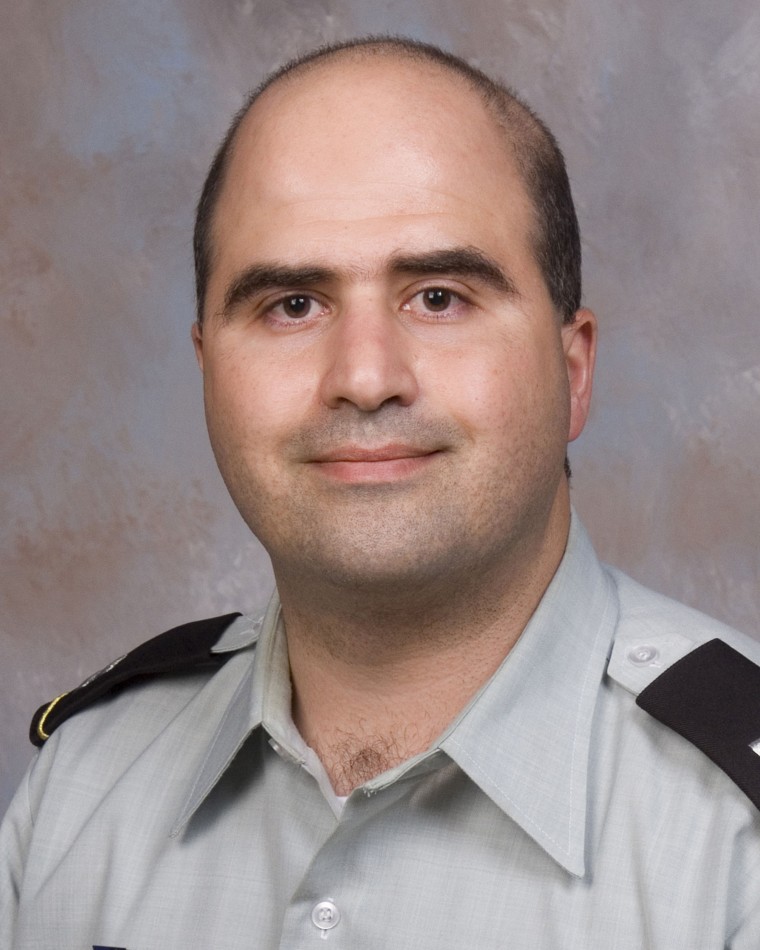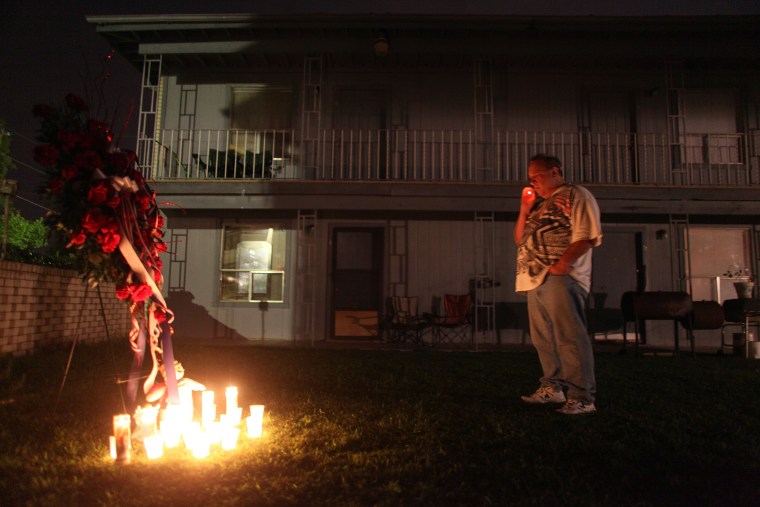About 9 a.m. Thursday, Maj. Nidal M. Hasan walked over to see a neighbor in his aging apartment building here on the edge of downtown. He had come to say goodbye.
The two occasionally would sit together in plastic chairs beneath a wind chime on the landing outside her second-floor apartment, she recalled. She was Christian and he was Muslim, but they shared coffee and talked about God. But this morning, Hasan said that he would be deploying to Afghanistan soon and that he did not want to go. He gave her a copy of the Koran.
"I'm going to do good work for God," he told her.
Then he walked downstairs, through the grassy courtyard, stepped into his silver Honda Civic and drove to Fort Hood. Four hours later, he allegedly opened fire in the Soldier Readiness Center in a rampage that killed 13 people and wounded 38, the deadliest shooting ever on a U.S. military installation.
Hasan, an Army psychiatrist, had moved into the 27-unit Casa del Norte apartments in late July when he was transferred to Ford Hood from Walter Reed Army Medical Center in the District. During his nearly four-month stay in apartment No. 9, Hasan made few friends. Most other tenants didn't know his name, referring to him as "Number Nine."
They said he often left his one-bedroom apartment at 5 or 6 in the morning, dressed in his uniform. Hasan usually did not return home until 6 or 7 in the evening, sometimes dressed in traditional Muslim clothes and carrying a Koran.
'He didn't have nobody'
Some nights as he came home, neighbors would be gathered around a picnic table in the courtyard drinking beer. As he climbed the steps to his apartment, they would snicker at him, said the woman, who lived several doors down. She agreed to describe her relationship with Hasan only on the condition of anonymity because she did not want to face retribution. Portions of her account were confirmed by other residents.
"Everyone else just sat down there and drunk their beer and looked at him and giggled at him," the woman said, starting to cry. "They just would laugh at him when he walked down with his Muslim clothes. . . . He was mistreated. He didn't have nobody. He was all alone. He went to his apartment there and was all alone."
The residents of Casa del Norte tend to be transient, and the place is a little worse for wear. The "d" on the sign out front is covered in duct tape and is nearly falling down. The gray gutters are rusted. A weathered banner greets tenants: "Welcome Home Ft. Hood Heroes -- We're Proud of You." Across the street is another apartment complex, the Brigadier, its cream brick marred by graffiti.

Hasan found the apartment through an advertisement in the Killeen Daily Herald, said Jose Padilla, a retired Army man who owns the complex. Hasan signed a six-month lease, at $325 a month. Hasan paid it all upfront with a cashier's check from Bank of America, Padilla said.
In mid-August, just a few weeks after moving to Killeen, Hasan had a run-in with a soldier living in apartment No. 12. One night after he had been drinking, John Van de Walker scraped a key along the full length of the passenger's side of Hasan's car. Then he removed and destroyed a bumper sticker that read, "Allah is Love," according to several residents, including live-in managers John and Alice Thompson.
Van de Walker had recently returned from service in Iraq and was distraught that his neighbor was a Muslim, Alice Thompson said. Shortly after the incident, Van de Walker's girlfriend, Jenni, came to visit Alice Thompson.
"I can't believe what John just did," Thompson recalled the woman saying. "John just keyed Number Nine's car. I told him, 'You're back from Iraq now, and you can't be doing anything that pops in your head like that.' "
Hasan filed a police report, but neighbors said he did not seem too bothered. According to the Associated Press, Van de Walker was arrested Oct. 21 and was charged with criminal mischief.
Neighbors said they did not know whether Hasan ever confronted Van de Walker. Resident Kim Rosenthal said Hasan told her he would forgive Van de Walker because it was the Muslim holy month of Ramadan.
"He told me, 'It's a time to forgive everybody who's done wrong against you,' " Rosenthal said.
Van de Walker was later evicted because of the keying and other disturbances, Alice Thompson said. Efforts to reach Van de Walker, his girlfriend and members of his family via e-mail and telephone were unsuccessful.
All of Casa del Norte's units have one bedroom, and the doors open to a long courtyard. There are bicycles stored beside the stairways and charcoal grills on the grass. Toy trucks belonging to the family that just moved in on the first floor are strewn about. Residents lean their mops on the balconies to dry. At the end of the courtyard is a small garden. A birdbath is filled with rainwater, but the flowers have died, save for a single pink rose.
On Tuesday, Hasan went to greet neighbor Patricia Villa, who had moved into apartment No. 8 a few weeks earlier. He gave her a Koran translated into Spanish. When Villa told him she read English, he returned the next day with a copy in English, she said.
Hasan saw that Villa, who makes tamales for a living, and her husband had little furniture. The living room was empty, except for a gold cross nailed near the door. She said Hasan told her he was being deployed to the war zone and would be gone for six months. So he brought Villa his microwave, four folding chairs, three small wooden shelves, an inflatable mattress, some new clothing and the steamer he used to press his uniforms.
"Not even your family will give you all this for free," Villa said.
On Thursday morning, Hasan asked Villa whether she would clean his apartment and return the key to the manager's office. He paid her $60 and said he would leave the key under Villa's doormat. When she returned home that afternoon, police and investigators were swarming her neighbor's apartment. The key wasn't there.
Staff writer William Booth contributed to this report.
